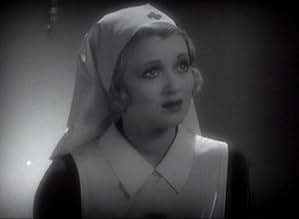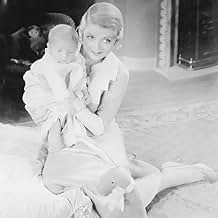A war officer who is thought dead returns to the woman he loves, only to find that she has remarried.A war officer who is thought dead returns to the woman he loves, only to find that she has remarried.A war officer who is thought dead returns to the woman he loves, only to find that she has remarried.
- Awards
- 1 win total
Daisy Belmore
- Tibbetts - Nurse
- (uncredited)
Billy Bevan
- Departing British Soldier
- (uncredited)
Edmund Breon
- Tom Kent
- (uncredited)
Eddy Chandler
- Captain Peters
- (uncredited)
Jay Eaton
- Dancing Doughboy
- (uncredited)
Bill Elliott
- Dancing Doughboy
- (uncredited)
Fred Esmelton
- Ponsonby's Butler
- (uncredited)
Mary Forbes
- The Duchess
- (uncredited)
Elizabeth Forrester
- Evelyn Kent
- (uncredited)
Robert Greig
- Hansom Cabby
- (uncredited)
Olaf Hytten
- Aide to Major General
- (uncredited)
Claude King
- Major General Visiting Hospital
- (uncredited)
Featured reviews
Born to Love (1931) is rather silly but nevertheless is a good example of a candid treatment of divorce law before the Production Code of 1935 put a stop to serious treatment of divorce or of pre-marital sexuality. Stuck in a loveless marriage to Wilfred, a haughty English aristocrat, Doris causes Wilfred to believe she has committed adultery. The consequences to her are catastrophic.
The plot is creaky and relies on numerous contrivances. The acting is highly forgettable. Nevertheless, the issues of fault-based divorce are important ones. The movie also concerns the conflict between marriage as an institution for love and fulfillment as opposed to a unemotional union designed for the mutual support of spouses and children. Needless to say, divorce law in the old days was much better adapted to the latter vision of marriage than the former.
The plot is creaky and relies on numerous contrivances. The acting is highly forgettable. Nevertheless, the issues of fault-based divorce are important ones. The movie also concerns the conflict between marriage as an institution for love and fulfillment as opposed to a unemotional union designed for the mutual support of spouses and children. Needless to say, divorce law in the old days was much better adapted to the latter vision of marriage than the former.
Not uninteresting pre-Code soap suds, wherein Yankee nurse Bennett, in London (nice historical touch: a bus advertising "Chu Chin Chow") meets Captain Joel McCrea, they have a torrid romance and pledge their troth, and while carrying his child she hears he's dead. We know he's not--he's second-billed, and there's an hour to go--but she thinks he is, so she marries Paul Cavanagh on the rebound and we wait for the fireworks that will erupt when McCrea returns. Connie's histrionic- -she gets to love, yell, sob, scream, and put on a phony British accent, even though she's playing American--and Paul Stein's camera likes to linger on her overemoting. But Joel McCrea was certainly the personification of solid masculine American values circa 1918 or 1931, and his sincere underplaying nicely complements her overplaying. The screenplay doesn't hate her for having a child out of wedlock, and the happy ending isn't that happy. So, by 1931 standards, it's an adult movie. Just not a very good one.
The first of four films Constance Bennett did with Joel McCrea was one that you'd
better bring the bath towels to the theater if you saw it. I'm sure even the men had
a tear or two seeing what Connie went through.
An American nurse in London during World War I Bennett has American ace Joel McCrea and stiff upper lip British major Paul Cavanaugh after her. She loves McCrea and can't see Cavanaugh.
But when McCrea gets shot down and goes missing in action she's very pregnant and the sympathetic Cavanaugh is ready to marry her and make her respectable.
The usual complications ensue after that and Bennett pays a heavy price for her romances.
Born To Love fits rater neatly into that category called women's pictures. Women who worried where the next meal might come from, plunked don their nickel and could sympathize with a woman like Bennett and her complicated romantic life.
For this type the film is OK, but I doubt we'll see a remake in this century.
An American nurse in London during World War I Bennett has American ace Joel McCrea and stiff upper lip British major Paul Cavanaugh after her. She loves McCrea and can't see Cavanaugh.
But when McCrea gets shot down and goes missing in action she's very pregnant and the sympathetic Cavanaugh is ready to marry her and make her respectable.
The usual complications ensue after that and Bennett pays a heavy price for her romances.
Born To Love fits rater neatly into that category called women's pictures. Women who worried where the next meal might come from, plunked don their nickel and could sympathize with a woman like Bennett and her complicated romantic life.
For this type the film is OK, but I doubt we'll see a remake in this century.
I saw the last part of this on TCM; it was Joel McCrea day.
It didn't really fit -- this is Constance Bennett's movie, 100%, and that's the problem. This has to be one of the worst performances of her career. Even making allowances for 1931, she is very histrionic and melodramatic, in all the worst, most silent-movie-cliché ways.
Technically, Paul L. Stein's direction is fine (for 1931), but it appears from this he was not an "actor's director". Oddly, Ms. Bennett's next film, "The Common Law," re-teamed her with director Stein and costar McCrea. It is better; not memorable, but at least she isn't painfully bad in this one.
It didn't really fit -- this is Constance Bennett's movie, 100%, and that's the problem. This has to be one of the worst performances of her career. Even making allowances for 1931, she is very histrionic and melodramatic, in all the worst, most silent-movie-cliché ways.
Technically, Paul L. Stein's direction is fine (for 1931), but it appears from this he was not an "actor's director". Oddly, Ms. Bennett's next film, "The Common Law," re-teamed her with director Stein and costar McCrea. It is better; not memorable, but at least she isn't painfully bad in this one.
I really love Constance Bennett and Joel McCrea and their underrated talent and range, but this film was just one emotional blow after another to Bennett's character, Doris Kendall, a nurse in Great Britain during World War I, to the point where it got hard to continue watching. The film starts out on a rather fascinating note - Doris is practically hypnotized by the sight of a German dirigible in a rather strange "dogfight" with British planes over London. Down goes the dirigible in a pile of flames.
Joel McCrea's character, Captain Barry Craig, pulls Doris out of danger and sparks begin to fly. At the same time, Doris is nursing an English nobleman (Paul Cavanagh as Sir Wilfred Drake) back to health from his war wounds and he has fallen in love with her. Captain Craig and Doris throw convention to the wind and spend one night together and consummate their relationship before he has to ship out to France. Then one tragedy after another ensues, some due to misunderstandings, some due to natural occurrences, and some due to divorce law in England as it stood in the early twentieth century in which one of the parties had to be the bad guy in order for divorce to occur with legally punitive measures taken against the party that is deemed to be "at fault".
This movie may costar McCrea, but this is really Constance Bennett's film all the way. Frederick Kerr is particularly noteworthy as an older member of England's upper class that has a crusty exterior that hides a gooey center - he's quite sympathetic and kind to Doris. Louise Closser Hale plays his wife who also has a crusty exterior but has a heart of - well - crust. In spite of these differences in viewpoint these two older members of the cast play off one another quite well.
Recommended, but not if you're looking to be cheered up.
Joel McCrea's character, Captain Barry Craig, pulls Doris out of danger and sparks begin to fly. At the same time, Doris is nursing an English nobleman (Paul Cavanagh as Sir Wilfred Drake) back to health from his war wounds and he has fallen in love with her. Captain Craig and Doris throw convention to the wind and spend one night together and consummate their relationship before he has to ship out to France. Then one tragedy after another ensues, some due to misunderstandings, some due to natural occurrences, and some due to divorce law in England as it stood in the early twentieth century in which one of the parties had to be the bad guy in order for divorce to occur with legally punitive measures taken against the party that is deemed to be "at fault".
This movie may costar McCrea, but this is really Constance Bennett's film all the way. Frederick Kerr is particularly noteworthy as an older member of England's upper class that has a crusty exterior that hides a gooey center - he's quite sympathetic and kind to Doris. Louise Closser Hale plays his wife who also has a crusty exterior but has a heart of - well - crust. In spite of these differences in viewpoint these two older members of the cast play off one another quite well.
Recommended, but not if you're looking to be cheered up.
Did you know
- TriviaThe first of four films co-starring Constance Bennett with Joel McCrea, the other three being The Common Law (1931), Rockabye (1932), and La revanche du coeur (1933).
- GoofsIn an early sequence set in 1918, Constance Bennett is shown playing a phonograph record on the Victor label--but the label is the "scroll design" Victor didn't use until 1925.
- Crazy creditsDebut of actress Eily Malyon.
Details
Box office
- Budget
- $338,000 (estimated)
- Runtime
- 1h 21m(81 min)
- Color
Contribute to this page
Suggest an edit or add missing content

























